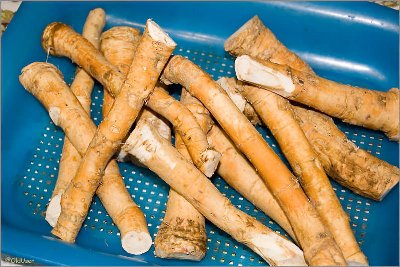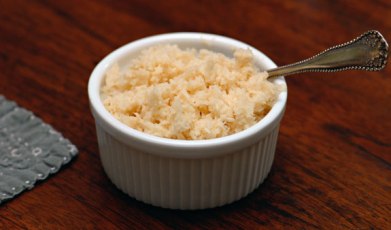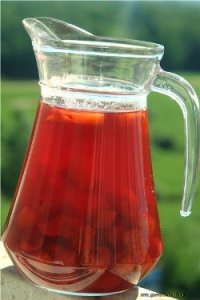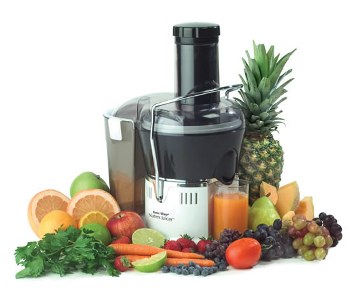Categories: "Food"
Хрен (часть первая)
One spice that Russians really like is хрен horseradish. Many American families never buy horseradish; I don't think my mother ever had it in our household, so it's worth pointing out that the horseradish root looks like this:

The root is then ground into a paste, and it is used as spice or a condiment on the side:

I've never encountered the word in the plural, only the singular:
| Sg | |
| Nom | хрен |
| Acc | |
| Gen | хрена |
| Pre | хрене |
| Dat | хрену |
| Ins | хреном |
Horseradish is used with a variety of dishes:
| В России часто подают ростбиф с хреном. | In Russia they often serve roast beef with horseradish. |
| Мама приготовила салат из хрена с морковью и яблоками. (recipe) | Mom made an apple, carrot and horseradish salad. |
| Хрен богат калием, кальцием, натрием, серой, фосфором, железом и другими минеральными веществами. (source) | Horseradish is rich in potassium, calcium, sodium, sulfur, phosphorus, iron and other mineral substances. |
Although хрен is a perfectly good word, completely acceptable in polite company, it has another use, too...
Warning! The following paragraphs contain Russian and English vulgarity.
Pages: 1· 2
Компот
 This morning I was reading about the Korean drink hwachae and realized “Hey, this is basically the same thing as компот!”
This morning I was reading about the Korean drink hwachae and realized “Hey, this is basically the same thing as компот!”
What is компот? It is a beverage made, essentially, by boiling fruit in water with some sugar and then letting the liquid cool down. You can make компот out of all sorts of fruit, fresh or dried. When you put a pitcher of it on the table, you leave the marvelous chunks of fruit in, not straining it out. The Grandma's Advice website lists the following versions:
|
|
It's a great summer drink of course, but the Russians will drink it in winter, too. Here are some sample sentences:
| Ещё компот, пожалуйста. | More compote, please. |
| Мама налила всем компот и поставила на стол тарелку с печеньем. | Mom poured compote for everybody and set a plate of cookies on the table. |
| — Очень вкусный компот! — Да, в нём и яблоки и груши. |
“Very tasty compote!” “Yes, it has both apples and pears in it.” |
| — Какой это компот? — Компот из айвы. — Я даже не знаю, что такое айва. |
“What kind of compote is this?” “Compote made from quinces.” “I don't even know what a quince is.” |
Сок (часть вторая)
Сок is the Russian word for juice.
This week I bought myself a juicer. Not just any juicer, but the one from the infomercials- Jack LaLanne's Power Juicer Deluxe!

Я купилa соковыжималку высшего класса.
I bought a high quality juicer.
It was very exciting! Ok, I admit it, I love gadgets. But this one is going to change my life, I just know it. From now on, I will drink healthy. Just think of the vitamins!

Всё, с сегодняшнего дня я сажусь на соковою диету.*
That's it, I am going on an all-juice diet, starting today.
Now it was time to try out my wonderful, new, health-making juicer. So I made a vegetable juice and a fruit juice. Unfortunately, the veggie was a failed experiment. It just wasn't yummy. The fruit juice on the other hand, was a complete success!
Я сделала очень вкусный сок из яблок, апельсинов, и сливы.
I made a delicious juice out of apples, oranges, and plums.
Having completed my juicer tests, it was time to clean up. This meant taking the machine apart and doing my least favorite chore: washing dishes.
Hmmm, I think it's time to take a short break from the Juicer Deluxe. Maybe I'll change my life and get healthy next year.
За неделю все соки мне надоели.
Within a week, I was sick of all juices.
*As you may have noticed, when speaking of "going on a diet," Russians will say that they are "sitting on a diet." Almost as though they will sit down and not budge from said diet.
Сок (часть первая)
The word for juice is сок. Usually when we talk about juice, we specify the type of juice, thus we have phrases like:
orange juice
grape juice
In English the phrase “apple juice” is made up of two nouns where the first noun modifies the second noun. In Russian you don't normally use a first noun to modify a second noun. Instead you change the first noun into an adjective and then use it with the second word, thus:
| Noun | Adjective | Phrase | Meaning |
| яблоко | яблочный | яблочный сок | apple juice |
| апельсин | апельсиновый | апельсиновый сок | orange juice |
| виноград | виноградный | виноградный сок | grape juice |
Here are some sample sentences:
| — Какой сок ты хочешь? — Яблочный. |
“What kind of juice do you want?” “Apple juice.” |
| Боря очень любит апельсиновый сок. | Boris really likes orange juice. |
| Я думал, что это яблочный сок, но оказывается, что это виноградный сок. | I thought that this was apple juice, but it turns out that it is grape juice. |
| Купи мне гранатовый сок, пожалуйста. | Buy me pomegranate juice, please. |
Many liquids sometimes appear in the genitive case to indicate ‘a quantity of,’ and juice is one of them. We call that usage the partitive genitive. Note the contrast in these sentences:
| Он выпил сок. (accusative) | He drank the juice. |
| Он выпил сока. (genitive) | He drank some juice. |
Сок is interesting because it has an alternative partitive genitive case form соку in addition to the regular genitive; sometimes we call those forms ‘second genitives.’ Thus you might come across:
| Он выпил соку. (second genitive) | He drank some juice. |
Those second genitives are becoming less and less common. They are more conversational in style, less formal. You are very likely to hear them out of the mouth of someone's grandmother. A younger person with a big-city education will use them less often.
Котлета
If you look up the word котлета in some Russian-English dictionaries, you will find the word cutlet as a translation. If you do, take your black pen and cross that line of the dictionary out. In modern American English a cutlet is a piece of meat, but it is NEVER ground meat.¹ In Russian котлета means a patty of ground meat.
You can have all sorts of ground meat patties, of course, from all sorts of animals:
| котлеты из говядины | hamburger patties lit. patties of beef |
| котлеты из курицы | chicken patties lit. patties of chicken |
| котлеты из рыбы | fish patties² lit. patties of fish |
Ground meat patties are very common in Russian cafeterias and on the table in Russian homes. Here are some sample sentences:
| — На каком масле лучше жарить котлеты? — Если мясо достаточно жирное, то не нужно никакого масла. |
“What kind of oil is it best to fry meat patties in?” “If the meat is fatty enough, you don't need any oil.” |
| Мама всегда добавляет чеснок, лук, соль и перец в фарш для котлет. | Mom always addes garlic, onion, salt and pepper to ground meat patties. |
| — Ты любишь котлеты? — Нет, я мясо не ем. — А рыбные котлеты? — Ну, да, против рыбных котлет я ничего не имею. |
“Do you like ground [meat] patties?” “No, I don't eat meat.” “What if they are made from fish?” “Well, yes, I don't have anything against fish patties.” |
| — Я сделал американский сэндвич из говяжей котлеты и двух тостов. — Какой ты невежда. Это называется «гамбургер». |
“I made an American sandwich with a beef patty and two pieces of toasted bread.” “You are such an ignoramus. That's called a ‘hamburger’.” |
¹ If you look at certain dictionaries, e.g. the current definition of cutlet at dictionary.com (mirror) includes something like “a flat croquette.” That is not a current meaning of the word in the US.
² Although “fish patties” is a perfectly grammatical phrase in English, I don't think I've ever had a fish patty in the US in my entire life. The phrase sounds bizarre to the average American ear.